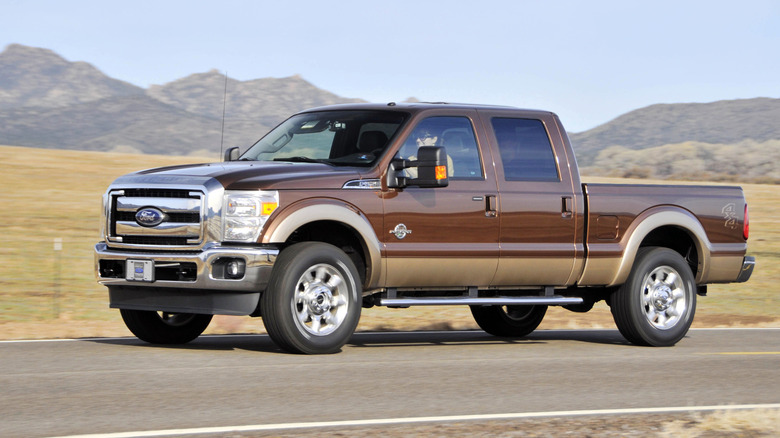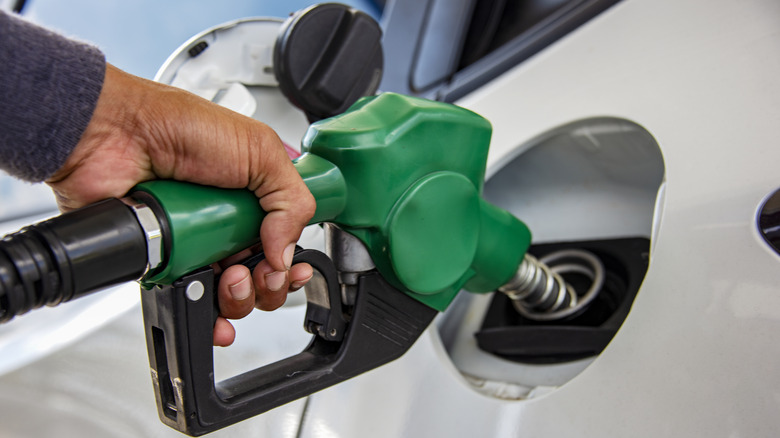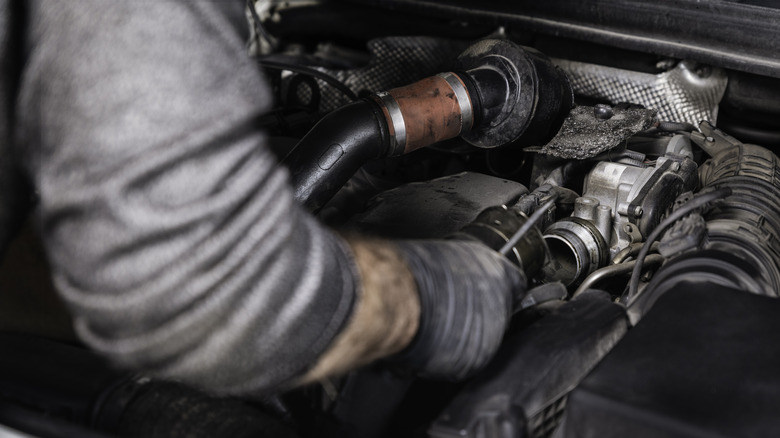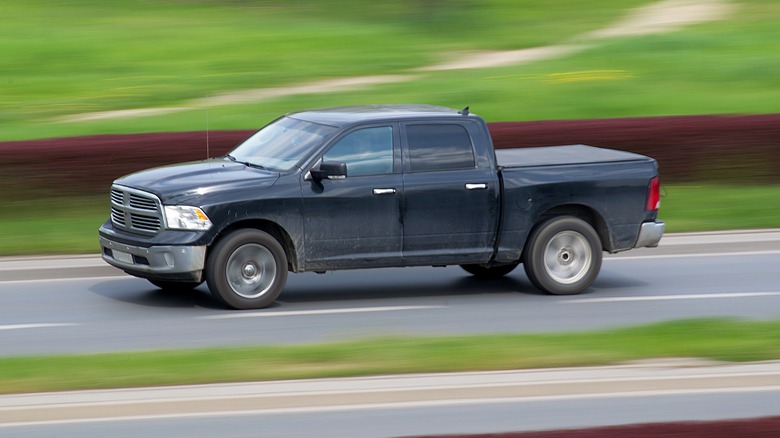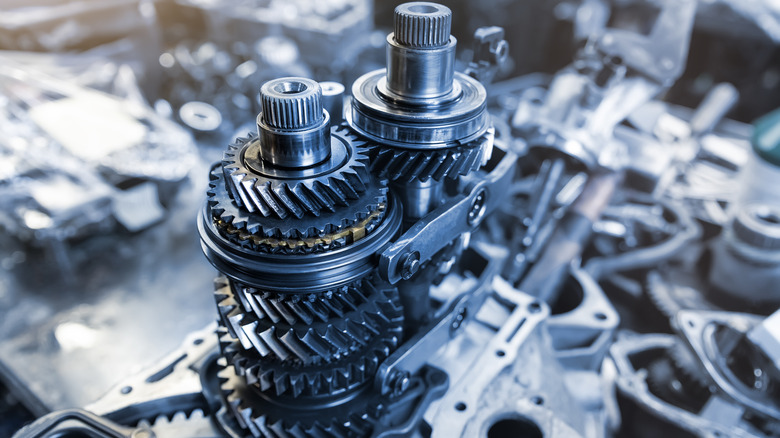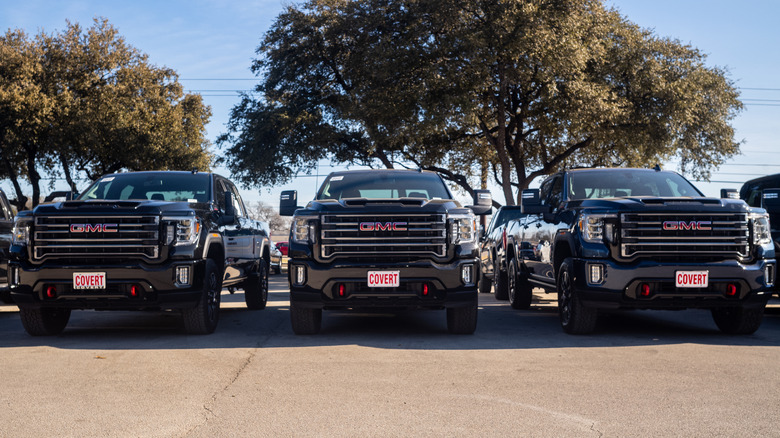Diesel Vs. Gasoline Pickup Trucks: Which Is Best For You?
When it comes time to purchase a new truck, there's a litany of factors to consider outside of simply what color it should be. Arguably, one of the most significant comes down to whether someone should buy a diesel or gasoline-powered vehicle. It may seem a moot point at first, since both use internal combustion engines, but there's so much more at play. Making the wrong decision could cost you thousands of dollars in extra costs over the years.
But as tends to be the case when it comes to truck purchases, there's no one-size-fits-all solution. Diesel trucks are not intrinsically superior to gas ones and vice versa. Before setting foot onto a lot, one needs to consider how they're primarily going to use a new vehicle. To help make that easier, this list features some of the most common major factors that go into a new truck purchase, outlining whether a diesel or gas pickup truck comes out on top.
While more research will be necessary when it comes to knowing the specifics of individual trucks, this list should hopefully narrow down the choices somewhat by allowing readers to know what category to pursue. It's one of many, as consumers also need to consider factors like whether to get a light-duty or heavy-duty truck. Buying a new vehicle can be one of the most significant investments a person makes, so it never hurts to have as much information as possible.
Initial cost
The most immediately noticeable difference between diesel and gas pickup trucks is the upfront cost. Stepping onto a lot, the diesel-powered trucks will cost significantly more, often between $5,000 and $10,000. That right there might deter people from investing in one, but there's a reason for the higher price tag.
A discussion of the price differences came up on Reddit, with many people believing diesel trucks cost more because they're popular right now. Redditor u/Lololololelelel offered this viewpoint: "They're expensive because they're in demand. People like them, and buy them to modify, drive for fun, etc. Few diesel owners actually genuinely need a diesel for the work they do."
That sentiment does appear to be backed up by data. A 2013 article from USA Today noted how diesel-powered vehicles saw increased registration rate between 2010 and 2012. The piece even seemingly confirms why that was the case: "Every time we've driven a new diesel car lately, we've been amazed at how indistinguishable they have become from conventional gas cars. No clatter. No smoke. No rattling engine noise."
As will be discussed later, diesel trucks often include far more efficient components that allow them to perform heavier-duty tasks compared to gas ones. Diesel engines are more efficient than gas engines because they don't need spark plugs and maintain a greater compression ratio of between 14:1 to 25:1 (compared to between 8:1 to 12:1 of gas). Still, the higher price tag may discourage some people right off the bat.
Winner: Gas-Powered Pickup Truck
Fuel cost and economy
There are a couple of factors to consider when determining whether fuel efficiency is preferable for a diesel or gas truck. The first (and one people are more likely to think about) is that diesel tends to cost more than gas. Prices fluctuate depending on location, but generally, diesel costs more for a couple of reasons. It's a scarcer commodity that's risen in price in recent years due to the Russian invasion of Ukraine. Gas prices rose as a result of this too, but only by 85% compared to the 109% increase in diesel PPI (in June 2022). Additionally, diesel has a greater federal excise tax, costing about six cents per gallon more than gasoline.
While gas-powered pickup trucks may appear to cost less in the long run, diesel trucks offer greater fuel efficiency. The diesel itself may cost more, but drivers may find they fuel up less. The United States Department of Energy claims that diesel engines are roughly 15% more efficient compared to their counterpart. Other sources suggest that superior fuel economy could be even higher, with Bell Performance noting, "A gallon of diesel fuel has up to 30 percent more energy than a gallon of gas." That advantage is most noticeable on the freeway compared to mere city driving.
Ultimately, individuals expecting to drive their trucks often may find diesel to be more advantageous due to how economical it is.
Winner: Diesel Pickup Truck
Maintenance
After accounting for the initial cost and fuel, another big expense is repairing the truck over the many years you may own it. Again, there are pros and cons to each when it comes to this. As mentioned previously, diesel trucks are designed to run more efficiently, and part of this comes down generally to having fewer parts compared to gas-powered vehicles. Spark plugs aren't used in diesel trucks because the engine uses compression to kickstart the combustion process. That's one less component owners have to worry about keeping tabs on compared to drivers with petrol vehicles.
Aside from spark plugs, diesel trucks are simply designed to run more efficiently, so they require fewer maintenance stops over the years. This sounds like a great thing, but when something does break down in a diesel vehicle, it may be more difficult to fix (and cost more). There are many diesel truck forums full of people trying to track down a specific part they need to get their vehicle up and running again. Inversely, gas-powered cars may need those pitstops more often, but they typically don't cost as much to fix.
It's a bit of a trade-off between frequency and price. However, drivers can potentially avoid greater hassles by avoiding six bad habits that can ruin a diesel engine to space out those trips to a mechanic's shop.
Winner: Draw
Acceleration
Pickup trucks may not inherently be the speediest vehicles in the game, but for anyone looking to zip around town, a gas-powered one is probably the way to go. Gas engines can typically attain higher RPMs over the alternative, which allows them to get from 0 to 60 mph much more quickly. Of course, it's important to check the specific specs to see what each truck can offer, but for the most part, gas is the way to go.
Again, it mostly comes down to each truck's individual specs, and it seems as though diesel trucks are giving gas engines a run for their money. Car and Driver reported in August 2023 how the 2023 Ford F-250 had become the quickest diesel truck to date. The truck was able to go 0 to 60 mph in just 5.5 seconds. Adding the fact the vehicle weighs over 8,000 pounds, it's an impressive display, and it's not alone. That's made possible thanks to the Ford 6.7L Power Stroke diesel engine, which is among the most reliable diesel engines ever built.
While diesel pickup trucks do seem to be getting faster, they're still primarily recommended for towing rather than accelerating. When it comes to zooming down the highway in the city, gas-powered still holds a slight advantage.
Winner: Gas-Powered Pickup Truck
Torque
Gas-powered pickup trucks may hold the edge in acceleration and speed, but diesel trucks are the way to go when it comes to hauling heavy loads. There's no question diesel engines hold the edge with regards to torque, thanks to exceptional cylinder pressure and turbocharger boost. Most diesel engines in pickup trucks can produce up to 15 to 30 PSI, and with modifications, that can easily go up to 50 PSI. This is why many diesel trucks are used for commercial purposes, where employees may need to haul something for an extended length of time.
Even for individual usage, diesel engines provide an ease to towing that's unmatched. Dave Sowers confirmed as much to Work Truck Online. "It's about picking the right tool for the job, but the torque advantage that comes along with a diesel engine is important if you find yourself towing often," Sowers detailed. "Diesel engines provide robust torque at lower speeds and are better suited for towing heavy loads up a steep grade as well."
However, it's not just torque that makes those heavy jobs go more smoothly. Diesel pickup trucks also include exhaust brakes within the exhaust system that reduce the truck's speed by creating extra backpressure. It makes it much easier to slow down and stop without putting as much strain on the wheel-mounted brake system to ensure those components last much longer. Sometimes, slow and steady wins the race, especially when you are towing important items.
Winner: Diesel Pickup Trucks
Off-roading
Many people want trucks to go off-roading, hitting the trails on terrain many vehicles couldn't withstand. While gas-powered trucks can certainly do a fine job, diesel is the way to go for most people who make off-roading a part of life. This all comes down to the aforementioned superior torque, as people generally don't need to worry about accelerating or high speeds when off-roading (not that anyone should be going too fast on rocky terrain anyway). This allows diesel trucks to utilize energy more efficiently and even haul larger items in case someone needs to bring something heavy out into the wilderness with them.
But that's not all. Since diesel trucks offer greater fuel economy, there's not as much of a concern about running out of fuel in the middle of the woods or desert. Going back to the diesel engine exhaust brake, these types of trucks are more reliable when it comes to slowing down without wearing down brake pads, which may come in handy when going down inclines.
However, there's a slight caveat with all this. Diesel trucks probably aren't ideal when driving over significant mud, especially if entering at more of a downward angle. Diesel engines at the front of the truck tend to weigh more than gas ones, running the risk of getting stuck in the mud if not traversing the terrain carefully. When it comes to rocks and hills, diesel engines have the power off-roaders require.
Winner: Diesel Pickup Trucks
Fuel locations
The American Petroleum Institute reports that there are over 145,000 gas stations throughout the United States, and not all of them sell diesel. While standard gas is easy to come by, Green Car Reports indicates that a little over half of such stations provide diesel. Granted, that article is from 2013, and with diesel trucks gaining in popularity, the number may have changed since then. Still, people with gas-powered trucks usually don't have to worry about where they can fill up, as gas is plentiful. The same can't be said for diesel quite as readily, which could lead to problems in unfamiliar locations.
The fact diesel trucks can go longer between fuel-ups definitely comes in handy if someone has to wait a while until they find a place to refill. Luckily, workarounds have also been developed to help those truck owners get by with fewer headaches. Various apps and websites will point someone in the direction of a station offering diesel. GasBuddy is one such option, where people can specifically search for diesel stations within a given zip code to find what they need. GasBuddy also just so happens to be one of the best apps for saving money on gas, and it can keep users up-to-date on special promotions.
It's probably not too much of a concern in a large city. However, diesel truck drivers may want to plan ahead on long trips.
Winner: Gas-Powered Pickup Trucks
Longevity
Many people drive their pickup trucks until the wheels fall off, and by and large, a diesel engine under the hood can give the vehicle a lifespan twice as long as gas. This comes down to the diesel engine having a more streamlined design that typically comes with features to help it withstand the wreckage of time. This includes higher compression and larger pistons. Overall, there are heavier-duty parts compared to what's usually found in petrol engines, allowing the individual parts and engine as a whole to last longer (but also making them more expensive to repair or replace). Additionally, diesel itself functions as a lubricant to keep the engine in good working order, whereas gasoline is a solvent.
In general, a gas-powered pickup truck can be expected to last up to 200,000 miles, assuming regular maintenance is done. Meanwhile, a diesel truck could go as high as 500,000 miles with routine maintenance. However, a variety of factors could make such a truck break down sooner, such as regularly using it to haul immensely heavy loads and failing to start the diesel engine correctly in cold weather. If a diesel truck only carries light cargo and primarily travels around a city, it could very well reach the 500,000-mile benchmark.
As is the case with any vehicle, the key to longevity is regular and proper maintenance. If handled correctly, a diesel pickup could still be viable after a decade on the road.
Winner: Diesel Pickup Trucks
Resale value
Since the lifespan of diesel engines is longer than most people realize, there's naturally going to be a higher resale value associated with them. A truck with a gas engine with 200,000 miles isn't going to sell for much since it's likely on its last leg. A diesel truck at 200,000 could still have a lot of life left, meaning when the time does come to look into a new truck, the driver can get more for the old one.
Used diesel trucks may sell for more, but remember, they also cost more upfront. It's a greater investment, and the maintenance costs (while less frequent) are going to be more expensive and may pop up more regularly as it gets older. All of those higher costs might deter potential buyers from investing when a used gas-powered pickup truck will cost significantly less (and have easier parts to find and replace). Then again, if someone really wants a diesel pickup truck but can't afford the higher prices of a new one, they may seek out one that's used. As stated earlier, demand for diesel trucks has increased, so there could be a real market for those types of vehicles.
Either way, it's best to keep a record of maintenance for any truck so prospective buyers can feel more comfortable purchasing it. Diesels may sell for more, but with so many factors to consider, it could ultimately be a wash.
Winner: Diesel Pickup Trucks (kind of)
Conclusion
Just doing a quick rundown of all of the previously mentioned categories, diesel pickup trucks come out on top more often. So does that automatically mean everyone needs to rush out to purchase one? Not necessarily.
Diesel trucks offer greater torque and better fuel economy, but they're mostly designed for people who plan on hauling heavy loads for long distances. Anyone mostly planning on driving the truck through town, and maybe hauling something every now and then, probably isn't going to need all that torque. Considering that they are more expensive to buy and repair, someone could wind up paying a lot more money for something that's too heavy-duty for the cause at hand.
A lot of people like the power associated with diesel trucks, but if they just need something basic, that won't serve any particular commercial purpose, a standard petrol-powered engine may be more suitable. Just because one type of truck works for one person doesn't mean it's suitable for everyone. Therefore, before buying anything, it's paramount to assess your own needs and determine what the pickup truck will primarily be used for. It's the best way to avoid spending an exorbitant amount of money while still having all the power necessary for whatever jobs come up.
